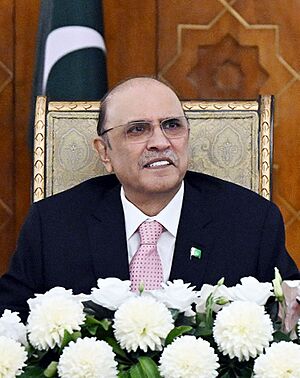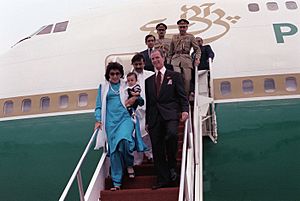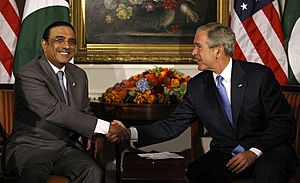Asif Ali Zardari facts for kids
Quick facts for kids
Asif Ali Zardari
|
|
|---|---|
|
آصف علي زرداري
|
|

Zardari in 2024
|
|
| 11th & 14th President of Pakistan | |
| Assumed office 10 March 2024 |
|
| Prime Minister | Shehbaz Sharif |
| Preceded by | Arif Alvi |
| In office 9 September 2008 – 9 September 2013 |
|
| Prime Minister | Yousaf Raza Gillani Raja Pervaiz Ashraf Mir Hazar Khan Khoso (Caretaker) Nawaz Sharif |
| Preceded by | Muhammad Mian Soomro (acting) |
| Succeeded by | Mamnoon Hussain |
| President of PPP-P | |
| Assumed office 27 December 2015 |
|
| Preceded by | Ameen Faheem |
| Co-Chairperson of the PPP | |
| In office 30 December 2007 – 27 December 2015 Serving with Bilawal Bhutto Zardari
|
|
| Preceded by | Position established |
| Spouse of the Prime Minister of Pakistan | |
| In office 19 October 1993 – 5 November 1996 |
|
| Prime Minister | Benazir Bhutto |
| Preceded by | Lilo Elizabeth Richter (caretaker) Kulsoom Nawaz |
| Succeeded by | Kulsoom Nawaz |
| In office 2 December 1988 – 6 August 1990 |
|
| Prime Minister | Benazir Bhutto |
| Preceded by | Begum Junejo |
| Succeeded by | Kulsoom Nawaz |
| Member of the Senate of Pakistan | |
| In office March 1997 – 12 October 1999 |
|
| Federal Minister for Investment | |
| In office 1995–1996 |
|
| President | Farooq Leghari |
| Prime Minister | Benazir Bhutto |
| Federal Minister for Environment | |
| In office November 1993 – 1996 |
|
| President | Farooq Leghari |
| Prime Minister | Benazir Bhutto |
| Member of National Assembly of Pakistan | |
| In office 18 November 1985 – 9 March 2024 |
|
| Succeeded by | Aseefa Bhutto Zardari |
| Constituency | NA-207 Nawabshah-I |
| Personal details | |
| Born | 26 July 1955 Karachi, Federal Capital Territory, Pakistan |
| Political party | Pakistan People's Party |
| Spouse | |
| Children | Bilawal Zardari Bakhtawar Zardari Aseefa Zardari |
| Parents | Hakim Ali Zardari Bilquis Sultana |
| Relatives | See Zardari family |
Asif Ali Zardari (born 26 July 1955) is a Pakistani politician who is the 14th president of Pakistan. He first served as president from 2008 to 2013 and began his second term in 2024. He is the first president of Pakistan to be born after the country gained independence in 1947.
Zardari is the husband of the late Benazir Bhutto, who was a former Prime Minister of Pakistan. He became a well-known figure after their marriage in 1987. When Bhutto became prime minister, Zardari faced accusations of being involved in financial disagreements, which some people believe led to the end of her government.
After his wife was tragically killed in 2007, Zardari became the co-chairman of her political party, the Pakistan People's Party (PPP). He led the PPP to victory in the 2008 general elections and was elected president. During his first term, he passed the Eighteenth Amendment to the Constitution of Pakistan, which reduced the president's powers and gave more authority to the prime minister and parliament.
In 2013, he became the first elected president in Pakistan's history to complete a full five-year term. After the 2024 election, he formed a coalition government and was elected president for a second time.
Contents
Early Life and Family
Asif Ali Zardari was born on July 26, 1955, in Karachi, Sindh. He grew up in a well-known family from the Sindhi-Baloch community. His father, Hakim Ali Zardari, was a tribal chief and a major landowner.
In his youth, Zardari enjoyed playing polo and boxing. His father owned a famous movie theater in Karachi called Bambino Cinema. Zardari even appeared as a child actor in the 1969 movie Salgira.
He received his early education at the Karachi Grammar School and later attended Cadet College, Petaro. There have been some questions about his college education, but this became less of an issue after a law requiring a college degree for politicians was changed in 2008.
Political Career
Marriage to Benazir Bhutto
Zardari's political journey began after he married Benazir Bhutto on December 18, 1987. Their marriage was arranged by their families, which is a common tradition in Pakistan. The wedding was a huge celebration in Karachi. This marriage helped Bhutto's political career, as it was more accepted for a woman to be married while in politics.
In 1988, Bhutto became the first female prime minister of Pakistan after her party won the elections. During her first term as prime minister, Zardari was accused of being involved in financial problems. These accusations were one of the reasons her government was dismissed in 1990.
Time in Government and Legal Troubles
After Bhutto's government was dismissed, Zardari faced several legal challenges. He was arrested in 1990 and spent time in jail. His family said the charges against him were politically motivated. While in jail, he was elected to the National Assembly. He was eventually released in 1993.
When Benazir Bhutto was re-elected as prime minister in 1993, Zardari served as the Federal Investment Minister. During this time, there was tension between Zardari and Bhutto's brother, Murtaza Bhutto. In 1996, Murtaza was killed in a shootout with police. Shortly after, Bhutto's government was dismissed again, and Zardari was arrested in connection with several cases. He spent the next several years in jail but was elected to the Senate of Pakistan in 1997 while still imprisoned.
Zardari was released in 2004 and went to live in Dubai. He returned to Pakistan after his wife, Benazir Bhutto, was killed in an attack on December 27, 2007.
Leader of the Pakistan People's Party
After Benazir Bhutto's death, Zardari was named the new co-chairman of the Pakistan People's Party (PPP). He chose to have their son, Bilawal Bhutto Zardari, become the official chairman to carry on his mother's legacy.
Zardari led the PPP in the 2008 elections. The party won the most seats, and he formed a coalition government with another major party, the Pakistan Muslim League (N) (PML-N), led by Nawaz Sharif. Together, they put pressure on the military ruler, Pervez Musharraf, who eventually resigned.
First Presidency (2008–2013)
On September 6, 2008, Asif Ali Zardari was elected the 11th president of Pakistan. His presidency faced many challenges, including a struggling economy and ongoing security issues.
Key Policies and Events
- Reducing Presidential Powers: One of Zardari's most important achievements was the 18th Amendment to the constitution in 2010. This amendment reduced the powers of the president, making the prime minister and the parliament more powerful. It was a major step toward strengthening democracy in Pakistan.
- Foreign Policy: Zardari worked to improve relationships with other countries. He maintained a strong alliance with the United States in the war in Afghanistan. He also worked on peace talks with India.
- 2010 Floods: In 2010, Pakistan experienced terrible floods that affected millions of people. Zardari's government was criticized for its handling of the disaster.
- Completing His Term: Despite many challenges, Zardari became the first democratically elected president in Pakistan's history to complete his full five-year term. He left office on September 9, 2013.
Second Presidency (2024–Present)
After his first term, Zardari remained active in politics as the leader of the PPP. Following the 2024 Pakistani general election, the PPP formed a coalition government with the PML-N. As part of their agreement, Zardari was nominated for president.
On March 9, 2024, he was elected president for a second time, defeating his opponent Mahmood Khan Achakzai. He took the oath of office on March 10, 2024. In one of his first acts, he chose not to take a presidential salary to help the country during an economic crisis.
As president, he has called for all political parties to work together for the good of the country. He has also focused on foreign relations, especially with neighboring countries like China, and has worked to strengthen Pakistan's economy.
Personal Life
Asif Ali Zardari was married to Benazir Bhutto from 1987 until her death in 2007. They have three children: a son, Bilawal Bhutto Zardari, and two daughters, Bakhtawar and Aseefa. Bilawal is the current chairman of the Pakistan Peoples Party.
Zardari is also the chief of the Zardari tribe, a title he inherited after his father's death in 2011. He is known to be a wealthy businessman with properties in Pakistan and other countries.
Images for kids
-
Zardari with Emomali Rahmon, Dmitry Medvedev and Hamid Karzai
-
Vice President-Elect Joe Biden meets Zardari in January 2009
-
Hamid Karzai, Joe Biden, Barack Obama, and Zardari after a meeting in May 2009
-
Zardari meets Hillary Clinton in May 2009
-
Zardari at a state reception in Islamabad with Azerbaijani President Ilham Aliyev and Pakistani Prime Minister Shehbaz Sharif in 2024
See also
 In Spanish: Asif Ali Zardari para niños
In Spanish: Asif Ali Zardari para niños
- Singapore Airlines Flight 117, the hijackers demanded Zardari's release
 | DeHart Hubbard |
 | Wilma Rudolph |
 | Jesse Owens |
 | Jackie Joyner-Kersee |
 | Major Taylor |








